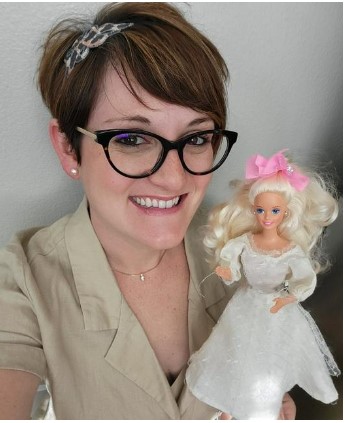Fresno State professor Amila Bercirbegovic recalls escape from Bosnian genocide

Courtesy of Amiila Bercirbegovic
Professor Amila Bercirbegovic holds Barbie in white wedding dress, a toy she played with as a refugee fleeing to Germany.
Feb 28, 2023
Originally from Prijedor, Bosnia, Amila Becirbegovic is a professor of German, genocide education and human rights at Fresno State. She earned her doctorate from the University of California, Davis in German literature and critical theory.
Becirbegovic is a survivor of the Bosnian genocide of the 1990s and a Bosnian refugee in Germany in 1992. She uses her personal experiences to better educate the upcoming generations.
“Only the most thoughtful teachers can discuss such horrible events and transform them into topics of contemplation, connection and enlightenment for the student. Dr. Becirbegovic is that teacher. I am very proud to call her a colleague and friend,” said Natalie Munoz, the chair of the Department of Modern and Classical Languages and Literatures.
She chose to teach German language, culture and history because it helps her understand how the generations of today remember the Holocaust. She also likes to have a better visual on how the media plays a role in post World War II representations.
“Genocide has become a recognizable meme for contemporary audiences through the recycled memory or (re)memory of the Holocaust, resulting in a hyper-mediated representation. Through my research and teaching, I seek to educate the next generation of thinkers to better understand how the past shapes our future,” Becirbegovic said.
Jenni Berrett, an undergraduate student at Fresno State, is currently taking a course with Becirbegovic. She says Becirbegovic’s lectures are filled with laughter, genuine care and reverence for her subject.
“Dr. B has the rare quality of being a professor who is as compassionate as she is rigorous. She cares as much about her students as she does her subject matter, and it’s pretty hard to overstate how important her critical scholarship in fascism and genocide studies is to the humanities and humanity itself,” Berrett said.
Being a college lecturer, Becirbegovic runs into issues just like any professor. Conflicts range from her students being miseducated on historic topics to individuals not caring because it doesn’t necessarily affect them.
“I think the most common issue is that people are tempted to ignore history, especially if the case history that they are investigating does not affect their community and group identity,” Becirbegovic said.
As a survivor of genocide, Becirbegovic says a photograph shared in the news in the 1990s is what saved her life.
An image that featured “a tortured and starving Bosnian inmate named Fikret Alic” was widely published in magazines and newspapers and led to international outrage. The image assisted in shutting down the concentration camps.
“That singular image played a vital role in saving my life, and I was fortunate to escape the war by relocating to Germany. This life changing event has led me down a path of exploration within the humanities, focusing specifically on representations of genocide and the important role that images and media play in affecting genocide memory,” she said.
In 1992, her family was forced to flee to Germany because men, women and children were taken to nearby concentration camps. Her family tried to lead a normal life, even with the tragedies surrounding them.
Her grandparents owned a small business where they made different types of clothing items. Her aunt, who worked with them, collected the scraps from any project she worked on. For Becirbegovic’s birthday in 1992, her aunt gifted her a white lace wedding dress for her favorite Barbie.
“I desperately wanted a sense of normalcy among nightly gunfire and countless sleepless nights lying awake, wondering if we would get captured and taken to a camp. My Barbies represented all things glitter, glam and a carefree life of prosperity and safety,” she said.
As the situation in Prijedor progressively worsened, her family went into hiding. Her dad managed to get them on a bus to Croatia, and what was originally supposed to be a two hour trip turned into an excruciating, overnight journey.
When they arrived in Zagreb, Croatia, they found a German connection and managed to make it to Langenhagen, Germany, after her grandfather sent for them. After eight years as refugees in Germany, her family relocated again, to the United States.
After all the hiding and relocating, Becirbegovic survived and her Barbie doll with the white lace dress did, too. As the years went on, Becirbegovic cherished the doll until she decided to donate it to a museum. The doll is now at the War Childhood Museum in Sarajevo, Bosnia and Herzegovina.
“As a professor who teaches genocide education, I hope that the same comfort and dreams of a better future that my treasured Barbie encompassed for me as a refugee will translate to the next generation of students through my stories, community service and teaching,” added Becirbegovic.
Her department colleagues have had positive experiences working alongside her. They have kind things to say about the kind of professor she is and how well she handles her subject.
“Dr. Becirbegovic has been a great asset to the MCLL department. Her enthusiasm and commitment to the German minor as well as her collegiality within our department and college have been unwavering,” said Gloria Medina-Sancho, a professor in the department.
Becirbegovic believes that time can heal all wounds and that there is a tremendous power in knowing another language. Her main goal is to educate her students on the memory of genocide case histories. She also aims to highlight the importance of historical entanglement.
“People often forget that genocide does not end when the history books and news media declare peace. For survivors of genocide, the wounds of the past persist into the present,” she said.






